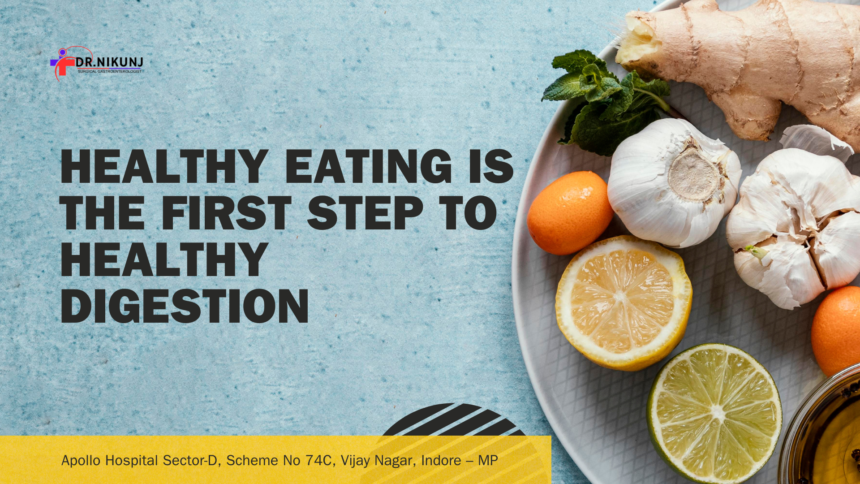Introduction
The saying, “You are what you eat,” holds a profound truth when it comes to maintaining overall health, and this is especially evident in the realm of digestion. The digestive system plays a crucial role in breaking down the food we consume, extracting essential nutrients, and eliminating waste. A key factor in ensuring the smooth functioning of this intricate system is adopting a diet that promotes healthy digestion. In this blog, we will explore Healthy Eating Is the First Step to Healthy Digestion, the symbiotic relationship between healthy eating and digestive wellness, emphasizing the significance of making mindful food choices for a thriving digestive system.
The Foundation of Healthy Digestion
Balanced Nutrition
A well-balanced diet is essential for providing the body with the nutrients it needs to function optimally. This includes a mix of macronutrients (carbohydrates, proteins, and fats) and micronutrients (vitamins and minerals). A deficiency in any of these components can lead to digestive issues, such as poor nutrient absorption and irregular bowel movements.
Fiber-Rich Foods
Fiber is a digestive superhero. It adds bulk to stool, prevents constipation, and promotes regular bowel movements. Whole grains, fruits, vegetables, legumes, and nuts are excellent sources of fiber. Including these foods in your diet can help maintain a healthy digestive tract.
Hydration
Water is fundamental to all bodily functions, including digestion. Staying hydrated ensures that the digestive system operates smoothly, aiding in the breakdown of food and the absorption of nutrients. Dehydration can lead to constipation and other digestive discomforts.
The Impact of Processed and Sugary Foods
Processed Foods
Highly processed foods, often laden with artificial additives, preservatives, and unhealthy fats, can wreak havoc on the digestive system. These foods are typically low in fiber and nutrients, contributing to digestive sluggishness and an increased risk of conditions like irritable bowel syndrome (IBS).
Excessive Sugar
Diets high in refined sugars have been linked to inflammation and disruptions in the gut microbiota. A disturbed gut microbiome can lead to various digestive issues, including bloating, gas, and an increased susceptibility to infections.
The Gut Microbiota Connection
Importance of a Diverse Microbiome
The gut microbiota, a community of trillions of microorganisms residing in the digestive tract, plays a pivotal role in maintaining digestive health. A diverse and balanced microbiome is associated with improved digestion, enhanced nutrient absorption, and a strengthened immune system.
Probiotics and Prebiotics
Including probiotic-rich foods (such as yogurt, kefir, and fermented vegetables) and prebiotics (found in fiber-rich foods) in your diet can promote the growth of beneficial bacteria in the gut. This balance is crucial for preventing digestive issues and supporting overall well-being.
Practical Tips for Healthy Eating and Digestion
Mindful Eating
Taking time to savor and appreciate each bite allows for better digestion. Chew your food thoroughly, as the digestive process begins in the mouth with the breakdown of food by enzymes in saliva.
Regular, Balanced Meals
Establishing a routine of regular, balanced meals helps regulate the digestive system. Irregular eating patterns or skipping meals can lead to overeating, indigestion, and disrupted bowel habits.
Limiting Trigger Foods
Identify and limit foods that trigger digestive discomfort. Common culprits include spicy foods, certain fats, and caffeine. Observing how your body reacts to different foods can help you make informed choices.
Conclusion
In conclusion, Healthy Eating Is the First Step to Healthy Digestion, healthy eating serves as the cornerstone of a well-functioning digestive system. A diet rich in diverse nutrients, fiber, and hydration supports the digestive process and fosters a harmonious gut microbiome. Conversely, the consumption of processed foods and excessive sugars can lead to digestive disruptions and long-term health issues. By making mindful food choices, incorporating probiotics and prebiotics, and adopting healthy eating habits, you empower your body to maintain optimal digestive wellness and overall health. Remember, the journey to a healthier digestive system begins with the plate in front of you.
Meet Your Doctor

The Best Laparoscopic Surgeon in Indore
Dr. Nikunj Jain is a renowned Gastro & Minimal Access Laparoscopic Surgeon.
He is a Surgical Gastroenterologist, Consultant Surgeon at Apollo Hospital, Indore having expertise in laparoscopic, Laser, and Robotic Surgery.
You can be confident that with Dr. Nikunj Jain your well-being is in the capable hands of a highly-skilled Minimally Invasive Laparoscopic & Robotic Surgeon. Dr. Nikunj Jain strives to treat his patients with an honest, straightforward, and caring nature in a safe and comfortable environment.
Dr. Nikunj Jain has been awarded Dr. B. Ramamurthi National Gold Medal by National Board of Examination.
drnikunjjain@gmail.com
Email your reports
+91-97114-59697
Call Now to book Appointment
Head Quarter Building
3rd Floor, Satya Sai Square, Vijay Nagar, Indore – MP
Apollo Hospital
Sector-D, Scheme No 74C, Vijay Nagar, Indore – MP
Read More –
What is the best treatment for Hernia? – https://drnikunjjain.com/what-is-the-best-treatment-for-hernia/
Can I live normal life with Piles? – https://drnikunjjain.com/can-i-live-normal-life-with-piles/
What should I do if I have a hernia? – https://drnikunjjain.com/what-should-i-do-if-i-have-a-hernia/


Leave a Reply